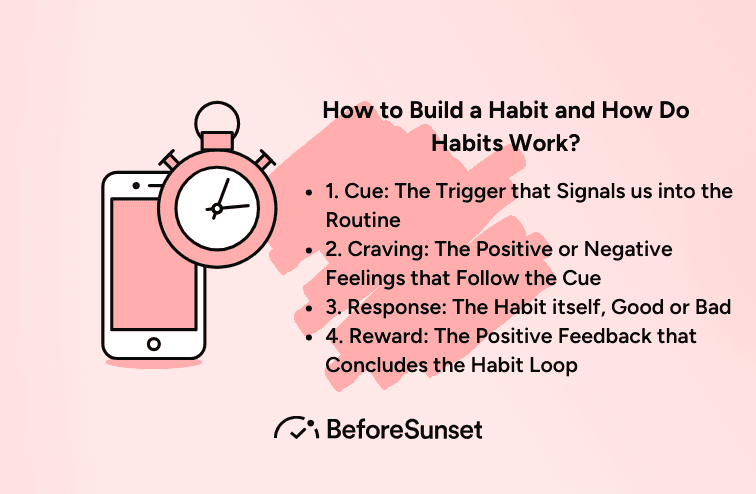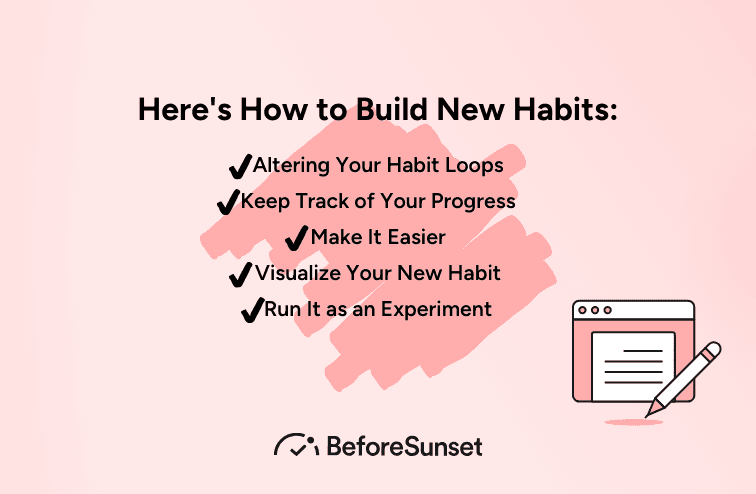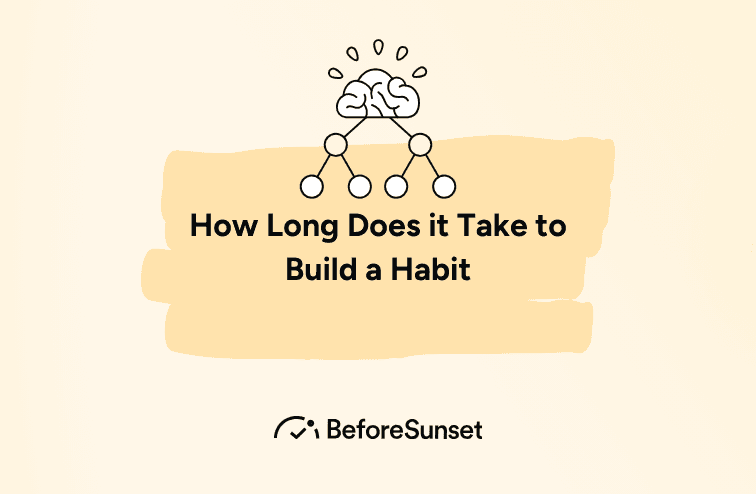Character is simply habits long continued.
-Plutarch
Our habits make us who we are. Our characters, where we are in life, and even our bodies are products of our habits. One look at the lives of successful people is enough to see just how important it is to develop productive habits. Habits that will be the golden ticket to achieving our goals.
Yet, at any given time, most of us seem to be struggling with building good habits and breaking bad ones. As a matter of fact, a study conducted by the University of Scranton found that 23% of people drop their New Year’s resolutions in the very first week!
But all is not lost. Building habits may not be easy, but you have already taken the first step by taking the initiative to research it. In this article, we are going to break down the process of building new habits into a few points that, if you manage to stick to will help you develop those long-coveted habits that are going to fast-track your success!
But to understand what we can do to build new habits, we first need to know how habits work and how they are built in the first place.
You might also like:

How to Build a Habit and How Do Habits Work?
Habits are good for the brain because they make it easy to find answers to hard questions. The mind is slow. It wants to keep doing the same things because it knows that's how we stay alive. People who have good habits and can stick to them are more likely to do well in life. Habits are the invisible architecture of our lives. They shape everything from how we think, feel, work and play.
Before we get into how we can take control of our habits, we first need to understand the exact procedure our minds follow when performing a habit. James Clear identifies this procedure as 'The Habit Loop' in his world-renowned bestseller 'Atomic Habits'. The habit loop is a simple, quadripartite process our minds carry out when we perform habits. These four steps are:
1. Cue: The Trigger that Signals us into the Routine
2. Craving: The Positive or Negative Feelings that Follow the Cue
3. Response: The Habit itself, Good or Bad
4. Reward: The Positive Feedback that Concludes the Habit Loop
Let's go over the process with an example to better understand the habit loop. Imagine yourself at work. You are in the middle of a task and suddenly get stuck at one part. You begin to get frustrated. This is your cue. Once your mind registers this frustration, it instinctively begins to look for ways to alleviate it.
The need to alleviate the frustration is your craving. To do so, your mind instructs you to go and make another cup of coffee. You leave work and go over to the coffee machine. This is your body's response. Drinking that cup of coffee helps you relieve stress. This is your reward. So far, so good. You go back to your desk and resume your tasks.
But Do You?
You see, the habit loop goes deeper than that. Through unconscious repetition, your mind has registered a bunch of other cues. Because, while waiting by the coffee machine, your mind also takes this as a cue and instructs you to check your messages. Then, while checking your messages, you trigger another cue, and so on.
Before you know it, it's been almost an hour since you got up to make coffee, and now you're even more frustrated for having lost the hour you could have used to finish the work in the first place!
But What Can We Do to Fix This?

Here's How to Build New Habits:
Here are 5 steps that will make the habit formation process easier for you:
1. Altering Your Habit Loops
If the above example made you feel like breaking the habit loop may be more challenging than you imagined, don't panic. And don't go over to the coffee machine, either! Because it turns out that one tiny tweak is all that's necessary to change your habit cycle forever. All you need to do is identify when you're about to give your usual response and change it with a new, more productive one.
For example, when you're stumped and feel like you need a cup of coffee, halt yourself. Then, rather than getting up for a coffee, go on the internet, and search around for a bit to see if you can learn something new that will help you overcome the problem. Or even lean back and do some breathing exercises to clear your mind.
Once you do this, your mind will enter uncharted waters and will not be able to respond as instinctively. Because, so far, whenever you found yourself in the same predicament, you followed its instructions without question. But now, you identified the response and stopped it. And now, you have the freedom to create a new habit chain.
At first, it might seem a bit odd as you're not used to this new chain of habits. You might even begin to crave coffee more than you used to. But try to stick to the new system and do it repeatedly whenever you find yourself stumped. Because after a while, your mind will begin to instinctively point you toward this new, more productive chain of habits rather than your old one.
2. Keep Track of Your Progress
The most important thing to remember is that you are a human. You will fail in achieving your habits but don't let it demotivate you. The trick here is to never give up.
Habit tracking is a simple and effective way of keeping yourself accountable. By keeping track of how you’re progressing, you will be able to identify your strengths and weaknesses. And this way, adapt and modify your habit-formation process to better suit your routine.
Suppose you see that you are regularly running behind on your pilates on Fridays and Saturdays. By tracking your daily exercises, you will be able to spot this more clearly and can act upon it much faster by spreading your exercises out throughout the rest of the week.
This is an old trick that might come as unnecessary at first, but it’s true that sometimes little post-it notes can do wonders for your habit development by reminding you to act. And seeing the ticks pile up will give you a big morale boost. Plus, you can also keep your sheets as trophies to look back and reminisce on after you successfully develop a new habit.
There are so many fantastic habit trackers out there that can help you on your journey. Some habit trackers we use here at BeforeSunset are Habitify and Coach.me. Or better yet, if your new habit is to do with using your time more effectively, why not try our AI-powered time-tracking tool? It’ll change your life.
3. Make It Easier
Making it easier for yourself is one of the most powerful techniques you can use when developing new habits. The same principle is used widely among people trying to break habits but seems to be underutilized when attempting to develop new ones. The logic behind it is very straightforward.
By placing your phone a distance away from you before sleep, you will be adding an extra layer of effort between you and the phone screen. That way, it will be much harder to reach your phone, which will lower the chances of checking your social media because it’s that much harder to do now.
Likewise, when developing a new habit, you will be making it much easier to implement into your routine by removing the barriers between you and the new habit.
An excellent example of this is working out at the office, doing a plank challenge? Why not do two minutes during your lunch break and two at home? This way your evening exercises won’t be too hard on you, making your new habit much more doable. Here are some practical workout ideas you can try out in the office.
4. Visualize Your New Habit
Developing a habit can be very difficult at times. And whatever techniques you may use, it will be your willpower that determines your success in the end. But we all lose motivation sometimes. It may come when it seems unnecessary to burden yourself more when you already have too much on your plate. When that happens, most people tend to give up and return to their old habits.
But in habit-development, the road to success goes through Determination street. So when you’re feeling the sting of your habit development process, look for ways to supplement your willpower.
Imagine yourself in your new office or your new car. Or think of yourself looking in the mirror and seeing killer six-pack abs. For most of us, imagining the outcome will boost our motivation and help us stick with the new habit when most others would quit.
A study conducted by UCLA analyzed the effects of this. The researchers found that outcome-based visualization is much more potent than process-based ones. So rather than struggling with how hard developing a new habit is, shift your attention to what it’ll be like once you accomplish it. That way you’ll give yourself a motivation boost to help you overcome those steep slopes
5. Run It as an Experiment
Developing a new habit is more challenging without learning how habits are built in the first place. You may have researched it and gained an amount of theoretical knowledge. But there is no one-size-fits-all when it comes to building a habit. So you may find that once you begin implementing your new habit into your routine, you might encounter unexpected issues.
And the best way to anticipate these is by doing a test run before you nosedive into the process.
The effects of this can be highly beneficial. Because by conducting a trial run of your new habit, for three days, for example, you can get glimpse of what issues you may face when you actually start your process. And by analyzing the information you get from your trial run, you will be able to know what specific alterations you need to make in your routine.
This will help you create a highly-personalized process custom-tailored to suit your environment, so when you begin your process for real, you’ll know just what exactly awaits you in your journey.
6. Reward Yourself! (Extra Tip)
It may be tempting to just go with the flow and forget about rewarding yourself once you've started your process. However, this will not only make your process less enjoyable, but also less effective.
In fact, rewarding yourself is an important part of the process because it motivates you to keep going and make your efforts last. So, remember to reward yourself for small victories every now and then.
Rewards can be anything you want them to be, but the most important thing is that they are related to your goal. For example, if you want to get more exercise, your reward could be a new pair of sneakers or an hour of free time. If you're trying to cut back on chocolate, a new book could be your reward.
Rewarding yourself is a step that often gets neglected. After all, rewarding yourself on the first day of a new habit may seem a bit unnecessary. But it’s genuinely one of the most critical factors contributing to your overall habit development.
As we mentioned above, rewarding yourself is one of the four steps of the habit loop. By making sure this step is felt more concretely, you not only increase the chances of sticking to the new habit but also contribute positively to your overall mindset.
This is one of the critical steps in B.F Skinner’s operant conditioning theory, whereby positive reinforcement, which can be anything from a popsicle to an all-inclusive holiday, makes our minds associate the happiness of the end reward with the behavior itself.
What is The 21 90 Rule?
The 21/90 rule is a frequently used idea in the field of habit formation and behavior modification.
It estimates that it takes about 21 days to create a new habit and 90 days to solidify it as a permanent lifestyle change.
Dr. Maxwell Maltz, a plastic surgeon, developed this guideline after seeing that it took his patients around three weeks to adjust to their new appearance following surgery.
However, the 21/90 rule is not a rigid scientific law, but rather a suggestion or heuristic based on observations.
The first 21 days are critical for establishing the initial routine and consistency, while the subsequent 90 days allow for habit reinforcement and integration into daily life.
This rule emphasizes the value of patience, tenacity, and dedication when attempting to adopt new behaviors or routines, underlining the fact that long-term change frequently necessitates continued effort over time.
What is The Best Way to Get Rid of Bad Habits?
Getting rid of unhealthy behaviors requires a multidimensional approach that includes self-awareness, strategic preparation, and constant effort.
To begin, identify the exact habits you want to modify, as well as the triggers and motives that drive them.
Once you've identified the habits, make specific and attainable goals to break them using the SMART criteria (Specific, Measurable, Achievable, Relevant, Time-bound).
Replace unhealthy habits with better ones, focusing on positive activities that are consistent with your beliefs and goals.
Implement measures to minimize or mitigate triggers that cause unpleasant behavior, such as changing your surroundings or routine.
Additionally, seek support from friends, family, or a therapist, since accountability and encouragement can help you succeed.
Practice mindfulness and self-reflection to become more aware of your thoughts, feelings, and behaviors, allowing you to identify and address patterns that contribute to bad habits.
Finally, be patient and persistent, acknowledging that change takes time and that setbacks are normal. Celebrate minor accomplishments along the way while remaining dedicated to your long-term well-being and creating healthy habits.
Don't forget that this is also very important for your mental health.
Bonus Tip!
At BeforeSunset, we are devoted to helping you in your journey to develop a new habit. Our AI-powered time-tracking software helps you monitor your time consumption to see how your habit progression is going. But it does more than that. It also analyzes how your time is spent each day and gives you insights into what you can do specifically to use your time more effectively.
Are you looking to cut down on sugar? Easy peasy. With our time management tool, you'll know precisely which hours of the day you're more prone to indulge. That way, you will know ahead of time when you're most likely to have a sugar crush and can take data-driven precautions to ride it out with minimal effort.
Oh, and did we mention it's completely free?
Sign up to BeforeSunset AI to learn more about what we can do to help you pick up a shining new habit!

